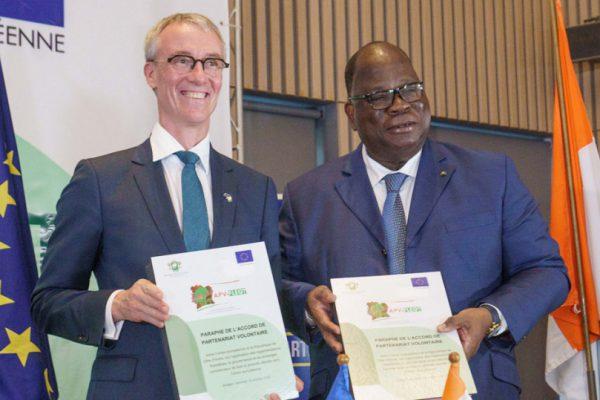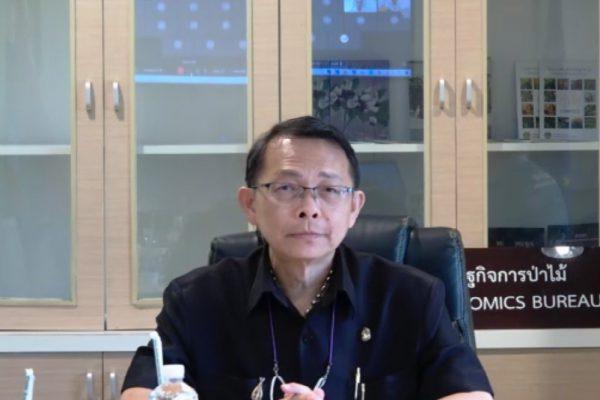On February 19th-21st, 2018, Thai-EU FLEGT Secretariat Office held a Sub-Working group workshop meeting with the EFI team. This is in order to develop on 4 elements which are (1) to draft Timber Legality Assurance System (TLAS), (2) to improve Legality Definition (LD), (3) to develop the process of Unregulated-Species-on Private-Land verification, and (4) to improve Thai Due Diligence System (TH – DDS). However, the discussing-based conclusions will be later brought to JEM3.
As of February 19th, 2018
For the timber legality assurance system (TLAS), there were some questions raised at the meeting as follows.
- The questions regarding differences between the LD and supply chain was raised.
- Non-restricted timber on private land should be clearly put in the supply chain control.
- The process of importing timber for both in the product scope (such as small pieces of timber products) and that is not in the product scope.
- The private sector concerns regarding issuing the license had been raised since there might probably be an obstacle for the operator because of the delayed project.
- Normally, FLEGT license is issued for each shipment in order to ensure the legality of every product both import and export.
- The authorized agency being in charge of issue FLEGT license could be specifically set an organization or committee which might be already in place or by providing them some additional tasks. Also, an authority or independent auditor might be set up to be in charge.
- The EFI team provided some study cases from Indonesia regarding issuing the license. Also, they informed that, presently, there is no specific organization erected for issuing the license in other countries.
- The EFI team provided an additional information regarding independent auditor saying that it could be an expertise in doing the audit or could be an International company which has some experiences in auditing work. Also, it is suggested that the stakeholders should play an important role as well in this case.
- About the cost of issuing FLEGT license, its cost is normally under the department who is in charge.
- For the differences between JIC and the organization that is responsible for issuing FLEGT license, in practical term, JIC is responsible for auditing and monitoring the implementation if there are any weak point to be addressed. Also, JIC will provide some guideline of what should be monitored. JIC will also receive information from the independent audit for developing suggestions. While those who are in charge of issuing the license will work on inside process of issuing the license.
As of February 20th, 2018
For the legality Definition (LD), there were some key conclusions as follows.
- It is suggested that the LD required for clarification of both operator compliance and regulator verification. By doing so, it would help to clearly differentiate its tasks and roles of the operator and regulator. The LD will be used as a legality manual for negotiating and indicating what timber is legal.
- It is suggested to include the regulation referred to the principle of ownership in the LD i.e. the Civil and Commercial Code.
- For any individual manual or guideline of each operator which is developed in order to comply with the labor or industrial regulation, it is suggested not to be put in the LD.
- EFI team committed to reviewing the LD in term of environment and labor requirement whether it is sufficient enough and also to send the feedback back to Thai-side.
- For the differences between chain of custody and supply chain, it is explained as following;
- The supply chain is what telling how timber links from one step to another step.
- Chain of Custody is what telling regarding origin control linking throughout the flow of the timber.
- For 6-month LD consultant scope of work as the following;
- Improving LD by bringing it together with supply chain which has to work parallelly.
- Reach out relevant departments for more information that should be put into the LD.
- Linking LD through supply chain control development i.e. LD and supply chain control verification.
- Reviewing the potential change of Thai law that is included in LD.
For the unregulated species on private land, there were some key conclusions as follows.
According to the meeting on unregulated species on private land by the sub-working group, there were 2 main agendas that have been raised. That was (1) how the verification for unregulated species on private land would be processed. In this case, the E-tree system is suggested to be one out of the other options used for the verification. Also, (2) what should be revised and added in order to prepare for the JEM3 meeting (next steps). Which are,
- It is important to rewrite the document and explicit roles of the industries and its linkage between the existing information (i.e. NSW) Importantly, it also needs to explain how the system works in the supply chain.
- The field test is suggested to practice in a comprehensive way for both E-tree and other options (especially for self-declaration) by focusing on how to deal with products produced by the unrestricted log.
As of February 21th, 2018
For the Thai Due Diligence System (TH – DDS), there were some key conclusions as follows.
Firstly, there was some feedback from the Sub-Working group together with some remaining questions.
- The minor operator should be excluded from the DDS.
- The process of the DDS needs to be discussed and bring to the conclusion before JEM3.
- To be aligned with the flowchart for consistency, the green-lane in the flowchart has to also be mentioned and explained in the paper.
Moreover, there were some suggestions to revise the DDS draft paper (the concept paper) as a preparation for the upcoming JEM3.



